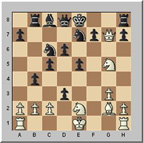‘As much as you enjoy winning, remember that winning every time is not ideal. Setbacks and losses are both inevitable and essential if you’re going to improve and become a good, even great, competitor.’
-Garry Kasparov, in his best-selling book, How Life Imitates Chess
 Challenges help us to improve our game, and inevitably, our life. The greater the challenge, the harder we fight to overcome, and the stronger we become. Kasparov tells us that in chess, we should lose as often as we can take it. There is no shame in losing. There is shame in not improving. The former world champion argues that “You’ll learn more from nine losses to strong opponents than from six wins and three losses against players who are at roughly your own level.”
Challenges help us to improve our game, and inevitably, our life. The greater the challenge, the harder we fight to overcome, and the stronger we become. Kasparov tells us that in chess, we should lose as often as we can take it. There is no shame in losing. There is shame in not improving. The former world champion argues that “You’ll learn more from nine losses to strong opponents than from six wins and three losses against players who are at roughly your own level.”
There is a disappointing trend among a few seniors in local tournament chess, which is, as soon as they lose a game or two, they retire from the tournament, sullen, and in vexation. The pairings are subsequently thrown out of balance, byes are shared around, and the remaining competitors sometimes do not face their strongest opponents. The tournament becomes watered down. Because those players who could not stand to lose walked away, the rest of the tournament is weakened and continues with major adjustments having to be made for a successful completion.
Kasparov has noted that a player can cope with losing. The technique is in avoiding the catastrophic losses in the key battles. Meaning, of course, that a player should try to win at all costs in the major competitions. So far the juniors have been playing on regardless of their losses in previous games. This is an encouraging sign, and we trust that it would continue as smoothly as it is doing now.
When we lose we have to assign the blame to ourselves. We should not blame our loss on dim lighting, a cold perhaps, noises, etc. Generally speaking, we have a tendency to blame everything else and everybody else except ourselves. We will only become stronger players when we adopt the attitude of blaming ourselves for our losses, whether it is so or not. Every time we lose, we can learn something from our loss. And here is where our concentration should be directed.
The Chess Federation is anticipating a large turn-out for the annual Topco Juices Chess Tournament which began yesterday at the Kei-Shar’s Sports Club. The incentives in cash are there for the prizewinners in the Junior and Senior categories. And Demerara Distillers Limited (DDL) is offering a one year supply of Topco Juices to the most outstanding junior player of the tournament. The focus among the sponsors of chess is currently on the juniors, and rightly so. Steadily, the quality of their games have been improving, but we need more concentration among them. They should look deeper into their positions before they commit themselves. Many of their games are over too quickly, which means enough time is not being spent on analysing and digging deep into positions before playing. Juniors remember, the stronger your chess, the stronger chess will be in Guyana.
Shirov v Pranav
 Super-grandmaster Alexei Shirov played a dramatic simultaneous exhibition match recently at the RA Chess Club in Ottawa, and was beaten by 12-year-old Pranav Sharma. The level of opponents who faced grandmaster Shirov was high – six masters, four players over 2300, eight experts over 2000 and fourteen A-Class players rated between 1800-2000. In an unusual gesture, Shirov alternated with the white and the black pieces. Usually, the master plays white only, as grandmaster Rainer Buhmann did when he visited Guyana last year. In the following game Shirov blunders on the 15th move and resigns.
Super-grandmaster Alexei Shirov played a dramatic simultaneous exhibition match recently at the RA Chess Club in Ottawa, and was beaten by 12-year-old Pranav Sharma. The level of opponents who faced grandmaster Shirov was high – six masters, four players over 2300, eight experts over 2000 and fourteen A-Class players rated between 1800-2000. In an unusual gesture, Shirov alternated with the white and the black pieces. Usually, the master plays white only, as grandmaster Rainer Buhmann did when he visited Guyana last year. In the following game Shirov blunders on the 15th move and resigns.
Pranav’s extraordinary win made the front page of the national newspaper, The Ottawa Citizen.
Sharma, Pranav – Shirov, Alexei Ottawa Simul, 2.2010
1.e4 c5 2.Nc3 Nc6 3.g3 g6 4.Bg2 Bg7 5.d3 d6 6.Be3 Rb8 7.f4 b5 8.Qc1 b4 9.Nce2 e5 10.Nf3 Nge7 11.f5 gxf5 12.Bh6 Bxh6 13.Qxh6 fxe4 14.Ng5 exd3 15.Qg7
15…Rg8?? After 15…Kd7 Black is clearly better. 16.Bxc6+ and since White is threatening mate on f7: Black Resigns! 1-0.
